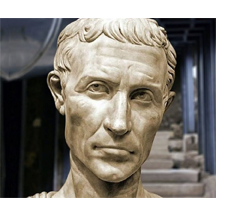One Column Page
and responsive to boot
Pilate's "What is Truth?"
by T. J. Smith
This article appeared in the
2024 Summer issue of Fulfilled! Magazine

Did any of you have to ride the school bus? I did. And the coolest place to sit was always in the last row. The front seat was designated for that geeky boy with horned-rimmed glasses, a pocket protector, and a tartan plaid patterned satchel. That kid would never sit on the back row. That privilege was reserved for the older boys, and 2nd graders did not challenge that birthright. But here you are, on the last page of Fulfilled! Magazine. In the back with TJ. It feels pretty cool back here, doesn’t it?
Don’t forget about the yearly conferences happening this year. Get plugged in and try your best to attend one, even if only by streaming online.
In the previous issue I had a nice interview with Pete and Rachael Wrue, (and I hope you picked up copy of either of their books), so I am going to tie this article to the one before the Wrue interview, where Pilate gets his answer from Yeshua about: “What is Truth?”.
If you like the article, you can purchase Volume 6 of my series “Understanding the Bible for Average Christians” at www.tjsmithministries.com. This month’s installment is a chapter in that book.
I was curious if Jesus ever answered Pilate’s question from John 18:38 “What is truth?” and if Yeshua did not answer, why? I used to think one reason Jesus did not answer Pilate was to fulfill this verse:
“He was oppressed, and he was afflicted, yet he opened not his mouth; like a lamb that is led to the slaughter, and like a sheep that before its shearers is silent, so he opened not his mouth.” (Isaiah 53:7, ESV)
However, Jesus did not remain silent while He was with Pilate. Here is the entire conversation between the two:
28 “Then they led Jesus from the house of Caiaphas to the governor’s headquarters. It was early morning. They themselves did not enter the governor’s headquarters, so that they would not be defiled, but could eat the Passover. 29 So Pilate went outside to them and said, ‘What accusation do you bring against this man?’ 30 They answered him, ‘If this man were not doing evil, we would not have delivered him over to you.’ 31 Pilate said to them, ‘Take him yourselves and judge him by your own law.’ The Jews said to him, ‘It is not lawful for us to put anyone to death.’ 32 This was to fulfill the word that Jesus had spoken to show by what kind of death he was going to die. 33 So Pilate entered his headquarters again and called Jesus and said to him, ‘Are you the King of the Jews?’ 34 Jesus answered, ‘Do you say this of your own accord, or did others say it to you about me?’ 35 Pilate answered, ‘Am I a Jew? Your own nation and the chief priests have delivered you over to me. What have you done?’ 36 Jesus answered, ‘My kingdom is not of this world. If my kingdom were of this world, my servants would have been fighting, that I might not be delivered over to the Jews. But my kingdom is not from the world.’ 37 Then Pilate said to him, ‘So you are a king?’ Jesus answered, ‘You say that I am a king. For this purpose I was born and for this purpose I have come into the world—to bear witness to the truth. Everyone who is of the truth listens to my voice.’ 38 Pilate said to him, ‘What is truth?’ After he had said this, he went back outside to the Jews and told them, ‘I find no guilt in him.’” (John 18:28-38 ESV; underline added)
Because He was like a silent lamb going to slaughter, He would offer no more revelations of His deity. The Savior said everything He needed to say. But did Jesus’ conversation with Pilate conflict with Isaiah 53:7? Not at all. Isaiah described the Jews as the ones leading Jesus to the slaughter, not Pilate. The Jewish leadership were the “shearers,” not Pilate. Context is king!
“Look! The wages you failed to pay the workers who mowed your fields are crying out against you. The cries of the harvesters have reached the ears of the Lord Almighty. You have lived on earth in luxury and self-indulgence. You have fattened yourselves in the day of slaughter. You have condemned and murdered the innocent one, who was not opposing you.” (James 5:4-6; underline added)
It was the Jews who would be destroyed, not the Romans: “. . . without being frightened in any way by those who oppose you. This is a sign to them that they will be destroyed, but that you will be saved—and that by God.” (Phil 1:28; underline added)
We also read this in Acts 4:10: “. . . then know this, you and all the people of Israel: It is by the name of Jesus Christ of Nazareth, whom you crucified but whom God raised from the dead, that this man stands before you healed.” (Underline added)
Jesus remained silent in front of His accusers, the Jews. But did Pilate ever understand what Truth was?
Here is some background on Passover lambs that explain Pilate’s statement to the crowd after speaking with Jesus.
“Jewish law required four days for the chief priests to inspect the Passover Lamb (Exodus 12:3–6). On Nisan 10, four days before the Passover on Nisan 14, the High Priest selected the Passover Lamb for the nation of Israel. During the next four days, the lamb was thoroughly inspected for blemishes and defects—anything that would disqualify it from being an acceptable sacrifice for the sins of the nation. At the end of this inspection period—assuming a positive outcome—the High Priest would publicly declare, “Behold the Lamb. I find no fault in him.”1
This four-day inspection of the Passover lamb confirms that the crucifixion of Jesus occurred on Wednesday, Nisan 13 (during “the twilight” of Nisan 14).
According to Avi Ben Mordechai, Yeshua entered the Temple on Palm Sunday (Nisan 10). Then, during the next four days (till Wednesday of the crucifixion week in AD 30), Jesus was interrogated (“inspected”) on four separate occasions by the Chief Priests and rulers of the Temple (Mark 11–12:34).
His interrogators could find no fault (i.e., no blemish or defect) in Him. “And after that no one dared to ask him any more questions” (Mark 12:34). Secular authorities also examined Him, all coming to the same conclusion: “I find no fault in Him!” (Italics in original.)
Pilate spoke the Truth in his next words: “I find no fault in Him.” Though the Savior called Himself the “Truth” in John 14:6, Pilate was not there, so we can cut him some slack for not knowing that. Yeshua was the perfect sacrifice and according to tradition, Pilate and Claudia eventually heard the Shepherd’s voice and repented and followed Christ.
You might want to go back and read the article on Pilate to refresh yourself with his life [2023 Winter issue].
Side Note: As believers in Yeshua and His fulfilled work, we are facing continual battles on social media, at church, and work. It’s coming from fake media, bad theology, any and all forms of twisting Scripture to somehow “spoof text” whatever one is trying to prove. Especially with the “END TIMES.” Let’s stay focused on the love we are to be sharing, the pure faith of Yahweh and our confidence that Yeshua is King.
Comments:
Your honest review will help others in their search for truth. If you must leave a negative review please be gracious.
Rather, speaking the truth in love, we are to grow up in every way into him who the head, into Christ . . . .
(Ephesians 4:15)
We use "Disqus" commenting software. If you are not familiar with "Disqus," click here for more information. You don't need a Disqus account to post comments, however, without an account you won't be notified if someone responds to your post.
 Fulfilled
Fulfilled